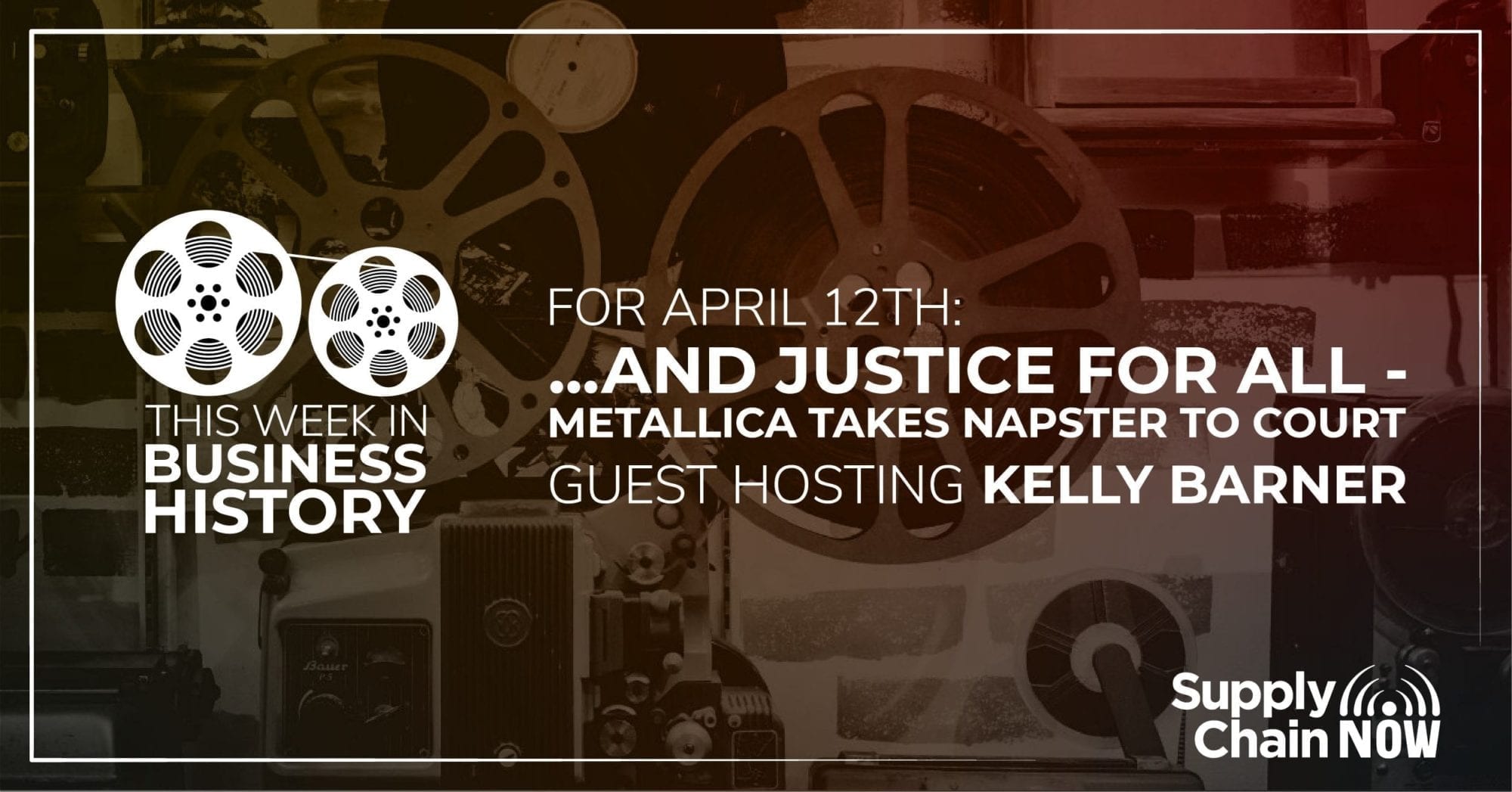Scott Luton (00:12):
Good morning, Scott Luton here with you on this edition of this week in business history. Welcome to today’s show on this program, which is part of the supply chain. Now family of programming. We take a look back at the upcoming week, and then we share some of the most relevant events and milestones from years past, of course, mostly business focused with a little dab of global supply chain. And occasionally we might just throw in a good story outside of our primary realm. So I invite you to join me on this. Look back in history to identify some of the most significant leaders, companies, innovations, and perhaps lessons learned in our collective business journey. Now let’s dive in to this week in business history.
Kelly Barner (01:10):
Hello, and thanks for joining us. I’m Kelly Barner, owner of buyers meeting point and the host of supply chain now’s dial P for procurement. You can join me on the third Tuesday of each month for a video live stream that runs from 12 to 1:00 PM Eastern. As I bring together the leading minds in corporate spend management and do my best to blur the lines between procurement and supply chain. I’m guest hosting this edition of this week in business history. So thanks so much for listening in this week show, we’ll be remembering a number of key stories, innovations, inventions, and firsts that took place between April 12th and the 16th. As you probably know, from the title of this episode, we’re going to start by spending some time in more recent business history, the year 2000 to be exact, but don’t worry. I have plenty of looks way back in time for you today as well.
Kelly Barner (02:07):
On April 14th, 2000, the rock band Metallica filed a lawsuit in Northern California district court against Napster, a peer to peer music sharing site. Before I get into the details of the case and its implications. Let me give you some background about the players. Metallica is a rock and roll hall of fame member band that is credited with taking the heavy metal genre of music mainstream, depending on your point of view, they are probably either too brutal to listen to or completely awesome. And revolutionary, I happened to fall into the completely awesome camp. Their songs and albums have titled like master of puppets ride the lightning, the unforgiven and sad, but true music is always a matter of taste. So Metallica may not be your of tea, but financially speaking, there really is no debate. The albums they released between 1983 and 2016 sold 121 million copies. And their current net worth was recently estimated at about $900 million.
Kelly Barner (03:17):
In 2019, Forbes listed the band is one of the world’s highest paid celebrities. So like to listen to them or not, not, they are hard to ignore and they were even more so in 2000, in the other corner, we have Napster, a peer to peer network for sharing MP3s or digital music files. Someone would download the Napster software program and install it on their computer. Then they would rip the songs off of a CD locally. That’s a compact disc for all of you. Digital natives listening in this process made it possible for everyone else in the Napster network to pull music from other members, computers. In other words, without buying the music themselves, part of what made the legality of this particularly tricky is that the music never lived on Napster’s own servers. They simply provided the software and the network functionality like a conduit for naughty behavior files went straight from member to member.
Kelly Barner (04:19):
They were never in possession of the music or the files at the time. They were no digital music services like Spotify or Apple iTunes. So this was a huge deal for bands, musicians and recording companies. It took dollars directly out of their hands. In fact, sometimes albums actually leaked out on Napster before they were even available for purchase in stores, seriously hurting the critical initial sales period. This exact thing actually happened to Metallica. This brings us back to the lawsuit. I mentioned some of Metallica’s album names before, but the most relevant one here is quote and justice for all. When Metallica filed their case in April of 2000, it became the first case that involved an artist suing a peer to peer file sharing software company, other artists, including Dr. Dre filed their own suits, but Metallica effectively stood alone as bold representatives of an entire industry.
Kelly Barner (05:23):
In fact, Lars Ulrich the drummer from Metallica even testified before a Senate judiciary committee hearing on downloading music on the internet in July of 2000, the courts ruled in Metallica’s favor and while everything wasn’t corrected over night, eventually Napster was forced to file for chapter seven bankruptcy and liquidate all of their assets. Despite the fact that they had received $15 million in VC money, Napster store may have ended, but the implications of this case live on the core was copyright infringement ownership of the content created and owned by the artists and recording labels in an official statement released by Metallica. At the time they stated quote with each project, we go through a grueling creative process to achieve music that we feel is representative of Metallica. At that very moment in our lives, we take our craft, whether it be the music, the lyrics, or the photos and artwork very seriously as do most artists, it is there for sickening to know that our art is being traded like a commodity rather than the art.
Kelly Barner (06:35):
It is from a business standpoint, this is about piracy taking something that doesn’t belong to you, and that is morally and legally wrong. The trading such information, whether it’s music, videos, photos, or whatever is in effect trafficking in stolen. Yeah, the goods and quote the conversation about copyright piracy and digital ownership still rages on through the rise of iTunes and the release of the iPod artists, such as Dave Matthews band Taylor Swift, Beyonce, Jay Z, and Kanye West have all weighted into the discussion, both in their own interest and on behalf of small, independent musicians around the world, no matter what form of content creation you or your business happens to be in, you need to know that their returns largely tied to rightful IP ownership are there to justify your investment of time, talent and resources, even organizations like supply chain now have Metallica to thank for our ability to operate a successful business based on content creation.
Kelly Barner (07:45):
Rock on. We now turn from rock law to consider some older business milestones on April 13th, 1860, the first pony express reached Sacramento, California. The 1800 good mile journey began in St. Joseph, Missouri 10 days earlier. The very first journey made by the fledgling service and required a series of horse and rider relay teams to complete established long before the U S was connected from East to West by the Telegraph system. And before there was a reliable cross continental railroad, the pony express was the only way to get letters and packages across the country, other than sending them around it by ship, which took about a month or by stagecoach, which took about three weeks while it was considered lightning fast and revolutionary for its time, the pony express was never profitable and it didn’t last long. It officially ceased operation in October of 1861, just about 18 months after being launched.
Kelly Barner (08:50):
Maybe the most amazing thing is the, the fact that it’s legend continues to live on in our minds as an enduring part of the American wild West, despite its very short operating tenure in an interesting coincidence, almost exactly 40 years later on April 16th of 1900, the us postal service released the first book of postage stamps. Individual postage stamps existed long before this, but this allowed people to buy a book of stamps. More like we know today you could buy 1224 or 48, 2 cents stamps with wax paper between them to prevent sticking. Let’s do the procurement thing for just a moment and compare the cost of a stamp at the time to sending mail via the pony express. When the express first started, it cost $5 for every half ounce of mail equal to about $130 today, prices were later reduced to just $1, but they still remain too high for regular people to make use of the service.
Kelly Barner (09:54):
When you compare that cost to 2 cent stamp prices, it becomes pretty clear that the pony express had a cost problem. And that is why they went quickly from launch to history. In my final pair of stories for the week, I want to share a couple of Titanic business history milestone. The first story is early. The Titanic, the RMS Titanic on April 14th, 1912 at 11:40 PM. The Titanic hit an iceberg, a few hundred miles off the coast of Newfoundland by 2:30 AM. The following morning, it was gone. The exact number of deaths has never been pinned down, but it is estimated to be between 1,490 and 1,635 people lost in the aftermath, the white star line, which owned and operated the Titanic and its parent company. The international mercantile Marine company were not found liable, but that doesn’t mean there weren’t changes made to maritime law. As a result, the international ice patrol was formed to monitor iceberg danger in the North Atlantic and warn ships about the size and location of moving icebergs.
Kelly Barner (11:13):
It conducts reconnaissance flights and produces charts for use by vessels to this day today’s ocean shipping lanes still benefit from this patrol and no ship that has heated. The ice patrols warnings has struck an iceberg in the North Atlantic. Pardon me? While I knock on wood, moving on to another Titanic, this one, uh, Titanic business McDonald’s on April 15th, 1955. Ray crock opened the first McDonald’s Inc restaurant in desk Plains, Illinois. It also happened to be the first McDonald’s of any kind East of the Mississippi river. Now I say of any kind, because of course the McDonald brothers opened the first, first McDonald’s in San Bernardino, California in 1950.
Speaker 1 (12:00):
Okay.
Kelly Barner (12:03):
I joined the company as a franchisee and eventually bought the brothers out, famously paying them $2.7 million. So they would each still be a millionaire even after paying their taxes. Ironically, there was a misunderstanding in the sale agreement. Ray crock thought he had purchased all of the existing McDonald’s locations, including the original in San Bernardino crock was furious when he realized what happened and that the brothers would be retaining that original location. And he retaliated by exercising his ownership of the brothers own name and made them rename the San Bernardino location. The big M. Then he opened a McDonald’s just one block away and swiftly put them out of business. Makes you wonder what he might’ve thought of. Metallica’s use of the court system to protect their music rights through Napster. Something tells me he also would have been on Metallica side in that fight.
Speaker 1 (13:03):
Well,
Kelly Barner (13:03):
That just about wraps up this edition of this week in business history. Big thanks to you for tuning into the show each week. Don’t forget to check out the wide variety of industry thought leadership available@supplychainnow.com. And as a friendly reminder, you can find this week in business history, wherever you get your podcast from and be sure to tell us what you think we would love to earn your review on behalf of the entire team here at this week in business history and supply chain. Now this is Kelly Barner wishing all of our listeners, nothing but the best on that note. We’ll see you next time here on this week in business history,



